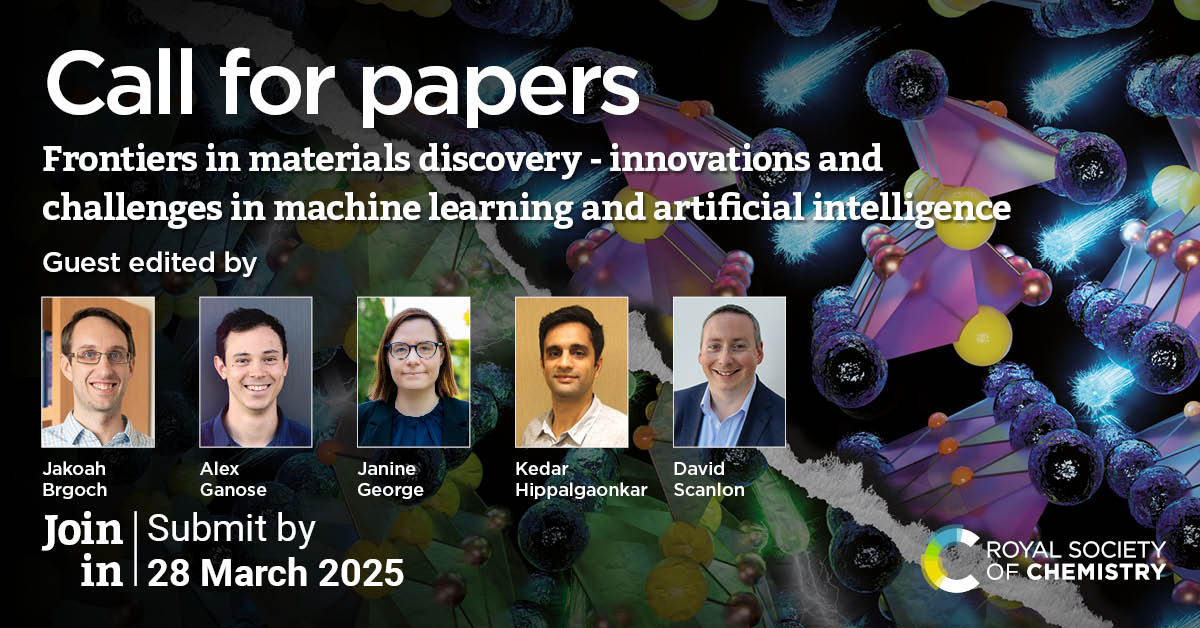Frontiers in materials discovery – innovations and challenges in machine learning and artificial intelligence
Submit your work before 28 March 2025
Materials Horizons, Journal of Materials Chemistry A, B and C and Materials Advances are pleased to announce an open call for papers for a joint cross-journal collection on ‘Frontiers in materials discovery – innovations and challenges in machine learning and artificial intelligence’.

Automation, machine learning, and artificial intelligence has enabled new frontiers in materials discovery. The advent of high-throughput calculations and the creation of comprehensive materials property databases, machine learning and AI are now equipped to navigate vast compositional spaces and effortlessly and rapidly predict physical properties. At the same time, automated laboratories are driving a revolution in synthetic methodologies. However, amidst these transformative developments lie specific challenges intrinsic to the autonomous discovery of materials. Interpreting characterization data is problematic, successfully synthesizing materials within lesser-known chemical spaces that have been identified by machine learning remains rare, and navigating the complexities of addressing crystal defects and disorder through simulation and synthetic processes is demanding. Much work remains to be done.
Guest Edited by Dr Jakoah Brgoch (University of Houston, USA), Dr Alex Ganose (Imperial College London, UK), Professor Janine George (Federal Institute of Materials Research and Testing (BAM), Germany, and University of Jena, Germany), Dr Kedar Hippalgaonkar (Nanyang Technological University, Singapore), Professor David Scanlon (University of Birmingham, UK), this themed collection convenes innovative research spanning various disciplines, including materials science, chemistry, physics, engineering, computer science, statistics, and robotics, with the aim of stimulating discussions and fostering novel collaborations. These interdisciplinary connections are essential for developing new AI-driven algorithms, automated processes, and human-robot collaborations crucial to enhancing the data-driven scientific workflow necessary for material discovery. A multitude of topics are explored, such as generative AI for material design, machine learning potentials, foundation model development, autonomous experimental and computational workflows, the seamless integration of chemical and physical insights into AI, automated material identification post-synthesis, large language models (LLMs), and the utilization of extensive, multi-modal materials data. Together, this collection will showcase recent advancements, spur the emergence of new ideas and partnerships, and define the prospects and challenges necessary to further this dynamic research field.
Appropriate topics include, but are not limited to:
- Generative AI for material design
- Machine learning
- Foundation model development
- Autonomous experimental and computational workflows
- Integration of chemical and physical insights into AI
- Automated material identification post-synthesis
- large language models (LLMs)
- Multi-modal materials data
The Editorial Office reserves the right to check suitability of submissions in relation to the scope of both the journal and the collection, and as such inclusion of accepted articles in the final themed collection is not guaranteed.
How to submit
Articles can be submitted at any time before the deadline via our online submission system to any of the participating journals. Please see the journals’ webpages linked above for more information on their scope, standards, article types and author guidelines and for more information on how to submit.
This open call is open for submissions of:
- Full Papers
- Communications
All manuscripts will undergo the normal initial assessment and peer review processes, if appropriate, in line with the journal’s high standards, managed by the journal editors. Accepted manuscripts will be added to the online collection as soon as they are published and they will be featured in a regular issue of the relevant journal and collated online into the collection. Please note that peer review or acceptance are not guaranteed.
If you would like to contribute to this themed collection, please submit your article directly through the journal submissions platform. Please quote the themed collection code XXMatDis25 when prompted in the “Themed issues” section of the submission form and mention that this is in response to the Open Call. The Editorial Office reserves the right to check suitability of submissions in relation to the scope of both the journal and the collection.
If you have any questions about the collection or the submissions process, please do contact the Editorial Office at materials-rsc@rsc.org and they will be able to assist.
Your institute may have a Read & Publish agreement in place with the Royal Society of Chemistry. This means that you may be able to publish gold open access for free – maximising the visibility and impact of your article to the broadest possible audience. Your institution’s agreement may already include the article processing charge for publishing as a corresponding author. Check here to find out more and to see if your institution has an open access deal in place.
We look forward to receiving your submission!










